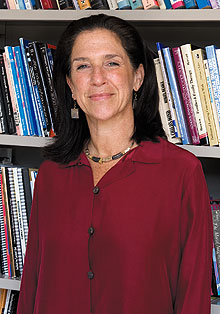  |
| HOME | THIS ISSUE | CALENDAR | GRANTS | BACK ISSUES | < BACK | NEXT > |
School reform organization moves to UConn by Robert Frahm - September 2, 2008 |
||||
| A nationally recognized school reform organization has moved its headquarters to the Neag School of Education, the latest step in making UConn a prominent center for urban school reform. ATLAS Learning Communities, which operates in about 60 schools across the nation, joins Neag’s Institute for Urban School Improvement with a 16-year track record that includes promising results in places such as New York City and Detroit. The partnership will allow educational researchers from UConn and ATLAS to test ideas on school reform by working with teachers and principals in real classrooms. “How do you really bring research and practice together?” says Linda Gerstle, executive director of ATLAS. “My hope is UConn will be a long-term home for these ideas. Having a university in back of you helps ensure that school innovation and transformation can be sustained.” Formerly based in Cambridge, Mass., ATLAS becomes the second major school reform group to affiliate with UConn, making the Neag School the home of two of the largest reform models in the nation, says Eugene Chasin, director of the Institute for Urban School Improvement. Accelerated Schools plus, a comprehensive school reform model based at Stanford University, moved to the Neag School eight years ago. The addition of ATLAS bolsters UConn’s role in turning around struggling elementary and secondary schools and helping close the achievement gap that finds many low-income and minority children lagging in reading, mathematics, and other subjects. “This is a wonderful opportunity for us because the ATLAS program is one of the top school reform programs in the country,” says Richard Schwab, dean of the Neag School. “It has proven you can have schools of high achievement regardless of where they are located and regardless of the entry-level skills of students.” The Neag School’s role in urban school reform will expand significantly this year, as UConn leads a new coalition of educational organizations working to reform eight of Connecticut’s lowest-performing public elementary schools. The coalition, known as CommPACT, not only will tap the expertise of Neag School faculty but will use ideas based on the work of ATLAS and Accelerated Schools, Schwab says. Across the nation, public schools have sought new ways to address the achievement gap, especially since the creation in 2002 of the No Child Left Behind Act, the centerpiece of President Bush’s school reform agenda. Unlike some school reform efforts, neither ATLAS nor Accelerated Schools imposes a specific curriculum or governance model.
Instead, both models focus on strengthening schools from within by promoting collaborations among teachers, principals, parents, unions, local businesses, and others. “The effort to bring people together creates a certain culture within a school and district,” Gerstle says. Unlike most schools where teachers work mostly in isolation, ATLAS schools bring teachers together regularly to collaborate on teaching and share their students’ work, she adds. ATLAS seeks to create a pathway of schools, allowing children to move from kindergarten through high school under a model that creates “a classroom and school culture of thinking,” she says. ATLAS schools, she adds, are “places of learning, places of developing intellectual character – not just getting the work done.” In addition, ATLAS emphasizes developing principals not just as managers, but as leaders, Gerstle says. ATLAS also places a premium on assessing student learning not only on tests but on the quality of regular schoolwork, including formal student exhibitions. “We know kids understand [schoolwork] when they are using evidence, when they are making connections,” says Louis Delgado, principal of Vanguard High School in New York City. Now in its third year at Vanguard, ATLAS has helped promote intellectual curiosity and rigor, he says. “In terms of student engagement, it’s been phenomenal.” A nationwide study issued in 2006 by the American Institutes for Research cited both ATLAS and Accelerated Schools as leading examples of reform efforts that promote collaboration and collegial interaction among educators – a factor the study said is associated with student achievement. ATLAS began as a research project in 1992 in school districts in Maine, Virginia, and Maryland. Its founders included some of the biggest names in education: Howard Gardner of Harvard University’s Project Zero; James Comer at Yale University’s School Development Center; Theodore Sizer, founder of the Coalition of Essential Schools; and Janet Whitla, head of the Education Development Center, a leading education research organization. |
| ADVANCE HOME UCONN HOME |

